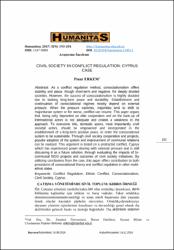| dc.contributor.author | Erkem ,Pınar | |
| dc.date.accessioned | 2018-07-24T08:51:39Z | |
| dc.date.available | 2018-07-24T08:51:39Z | |
| dc.date.issued | 2017 | |
| dc.identifier.uri | https://hdl.handle.net/20.500.11776/2869 | |
| dc.description.abstract | Çatışma yönetimi modellerinden biri olan ortaklıkçı demokrasi, derin bölünmüş toplumlar için istikrar ve barış vadeder. Fakat ortaklıkçı demokrasisisteminindevamlılığı ve uzun süreli başarısına dair yaşanan örnek olaylar kaynaklı şüpheler mevcuttur. Ortaklıkçıdemokrasiye dayanan yönetim rejimlerinin kurulması ve devamlılığı genel olarak dış aktörlerden gelecek baskı ve desteğe bağımlıdır. Dış aktörlerin sistemindevamını sağlamak için desteği ve etkisi ortadan kalktığında, çatışmalı toplumdaki çoğunluk grubun, çoğunlukçu yönetim sistemine dönme eğilimi olduğu veya daha kötüsü, toplumlar-arası çatışmanın devam ettiği görülmüştür. Bu makalenin iddiası, sadece elit işbirliğine ve uluslararası aktörlerin desteğine bağımlı olmanın ortaklıkçıdemokrasi sisteminin başarısı için yeterli olmadığı ve bunun ortaklıkçı demokrasi teorisinde bir zayıflık yarattığıdır. Bunu aşabilmek ve ortaklıkçı sistemin sürdürülebilirliğini sağlayabilmek için, yerel aktörler, özellikle sivil toplum aktörleri güçlendirilmeli ve uzun dönemli barışın sağlanması çabasına dâhil edilmelidir. Sivil toplum işbirliği ve projeleri sayesinde sistemin toplum tarafından benimsenmesi sağlanabilir ve gruplar arası ilişkiler geliştirilebilir. Bu iddia, iki toplumlu STK projelerinin ve sivil toplum girişimlerinin ortaya çıkardığı sonuçlar ekseninde, uzun süreli bir çatışma olan Kıbrıs üzerinde test edilecektir. Kıbrıs dış güçlerin etkisiyle ortaklıkçı sistemi denemiştir ve hala gelecekteki çözüm planı olarak aynı sistem tartışılmaktadır. Bu örnek çalışmadan çıkarılacak sonuçlar, hem ortaklıkçı demokrasi teorisi için hem de diğer çok etnikli ülkelerdeki çatışmaların yönetimi için faydalı olacaktır. | en_US |
| dc.description.abstract | As a conflict regulation method, consociationalism offers stability and peace, though short-term and negative, for deeply divided societies. However, the success of consociationalism is highly doubted due to lacking long-term peace and durability. Establishment and continuation of consociational regimes mostly depend on external pressure. When the pressure vanishes, majorities tend to shift to majoritarian system or for worse, conflict can resume. This paper argues that, being only dependent on elite cooperation and on the back-up of international actors is not adequate and creates a weakness in the approach. To overcome this, domestic actors, most importantly civil societal actors, should be empowered and incorporated in the establishment of a long-term positive peace, in order the consociational system to be sustainable. Through civil society cooperation and projects, popular adoption of the system and improvement of communal relations can be realized. This argument is tested on a protracted conflict, Cyprus which has experienced power-sharing with external pressure and is still discussing it as a future solution, through evaluating the impacts of bicommunal NGO projects and outcomes of civil society initiatives. By utilizing conclusions from the case, this paper offers contribution to both procedures of consociational theory and conflict regulation in other multiethnic states. | en_US |
| dc.language.iso | tur | en_US |
| dc.publisher | Namık Kemal Üniversitesi | en_US |
| dc.rights | info:eu-repo/semantics/openAccess | en_US |
| dc.subject | Conflict Regulation | en_US |
| dc.subject | Ethnic Conflict | en_US |
| dc.subject | Consociationalism | en_US |
| dc.subject | Civil Society | en_US |
| dc.subject | Cyprus | en_US |
| dc.subject | Çatışma Yönetimi | en_US |
| dc.subject | Etnik Çatışma | |
| dc.subject | Ortaklıkçı Demokrasi | |
| dc.subject | Sivil Toplum | |
| dc.subject | Kıbrıs | |
| dc.title | Çatışma Yönetiminde Sivil Toplum: Kıbrıs Örneği | en_US |
| dc.title.alternative | Cıvıl Socıety In Conflıct Regulatıon: Cyprus Case | en_US |
| dc.type | article | en_US |
| dc.relation.ispartof | HUMANITAS - Uluslararası Sosyal Bilimler Dergisi | en_US |
| dc.department | Tekirdağ Namık Kemal Üniversitesi Dergileri | en_US |
| dc.authorid | 123888 | en_US |
| dc.identifier.volume | 5 | en_US |
| dc.identifier.issue | 9 | en_US |
| dc.identifier.startpage | 193 | en_US |
| dc.identifier.endpage | 201 | en_US |
| dc.relation.publicationcategory | Makale - Ulusal Hakemli Dergi - Başka Kurum Yazarı | en_US |



















